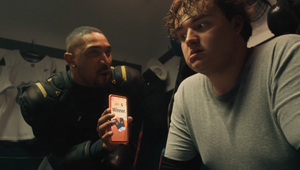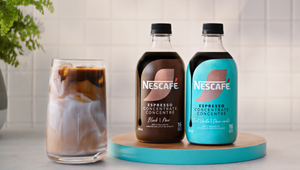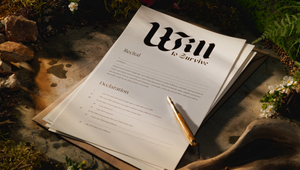
5 Minutes with… Niki Sahni

As president and partner at Courage, Niki Sahni has been an integral figure in the Canadian independent agency’s rise since opening its doors one year ago. Bolstering nearly 20 years of experience, her passion for solving clients’ pressing business challenges, as well as her unique approach to account management has made her a go-to collaborator for brands such as KFC, Diageo, Scotiabank, Nestlé, and many more.
A prominent industry leader within Canada, Niki believes that advertising should be fun, and is not only passionate about cultivating effective agency-client relationships, but ensuring that agency life and culture is healthy, all while gearing up Courage for strong, sustainable success in both 2023 and beyond.
To get the insights driving these leadership decisions, LBB’s Josh Neufeldt sat down with Niki for a chat.
LBB> How did you get started in advertising? Tell us your story!
Niki> I graduated from McGill University with a bachelor of commerce in (ahem) 2006, with a major in marketing. Most of my peers went client side - I think there were only a handful of us that decided to try agency life. I knew next to nothing about advertising agencies - I didn’t even know which ones were considered ‘good’ agencies to work at. I basically googled ‘advertising agency’, made a spreadsheet, and applied to every single one of them. Luckily, I ended up interning at Lowe Roche for six months, and that kick started my career in account service.
LBB> Since then, what has your experience been like? How have things changed, and what have you done to keep things fresh?
Niki> While [17 years] has passed in the blink of an eye, I remember being an account executive and being at the office almost every day until 10 pm. I enjoy the fact that that has changed, not only for myself, but it’s getting better industry-wide as well. I regularly tell my teams that working late nights sometimes happens for a couple of weeks, but if it passes three, then we need to add a new resource to the team. At Courage, we try to prioritise work/life balance across the full agency.
Beyond that, advertising itself keeps things fresh! I got into the business because I was interested in working on all sorts of marketing and clients, not just diving into one on the client side. This year was my first time working on QSR, with KFC, and I’ve been amazed at the pace and volume of work. At the same time, I remember conversations about how to better integrate an idea with digital when I was interning 17 years ago - and those conversations still continue to this day.
LBB> Notably, you launched Courage just this last year, which has since seen rapid growth! To what do you attribute this success? And did you anticipate your first year going so well?
Niki> We wouldn’t have any of this amazing success without, firstly, the people who work with us at the agency, and secondly, the amazing creative they produce with an aim to drive actual business results for our clients. And, they are amazing, kind, thoughtful people to boot. I truly believe that those two things draw clients into wanting to work with us and create an environment for some incredible partnerships, not only within the agency, but with our clients as well.
LBB> This is especially impressive, given Courage’s status as an independent, rather than a network agency. How did you work towards sustainable growth, and how did your approach vary given the fact that you are an indie agency?
Niki> From the jump, we’ve talked about pitching business as ourselves, in a style that works for us, and from there, evaluate whether or not a client is a good fit not only culturally, but in the type of work that we want to do, in the collaborative way that we like to work, and honestly, at the end of the day, also financially. Ultimately, we run a business, and being profitable allows us the opportunity to treat our people well, to work with pro bono clients that we believe in, and to reinvest in what we do. We look at new business as a chance to ask ourselves ‘do we want to work with this client?’ just as much as I think they’re asking themselves ‘do we want to work with Courage?’.
LBB> Where are you trying to take Courage as a whole, both business wise and internally across 2023 and beyond?
Niki> I don’t ever want to measure Courage against a revenue goal, a ‘people’ goal, or a ‘how many offices do we have’ goal. I think when you start to do that, you start to chase the wrong things by going down the wrong path. The phrase I use the most at Courage is ‘sustainable growth’ - probably to the point where it makes everyone else want to barf - but I think businesses that grow too quickly end up caught in a growth spiral. I try to measure our success against three things: are we doing the best possible creative work we can do, are our clients happy with our relationship, and are our people happy at the agency? And then we can find growth in ticking off those boxes either against new business or organic growth.
LBB> Building on this, how would you describe your leadership style, and what factors play the biggest role in this?
Niki> My leadership style is totally thieved - I’ve tried to steal attributes and qualities from the incredible leaders and people I’ve worked with in the past. And even from fictional characters like Jean Luc Picard and Kermit the Frog!
I believe in hiring great people and just getting out of the way, other than supporting them as much as I can. It always perplexes me when leaders are upset that their team members are moving on to other agencies or roles - I’d love for my team to stay at Courage forever, but I also want them to take on the challenges and do the great things that I know they’re all capable of. I also fundamentally believe that what we do is fun - is it stressful and serious sometimes? Yes, but I think if you’re losing sleep night after night stressed about your job, you’re probably not at the right agency or working on the right piece of business.
LBB> One of your most notable qualities is your unique approach to account management. What sets you apart, and how does this process allow you to build strong relationships with big brands across the country?
Niki> To me, there are three things that make a great account person:
Being genuinely interested in your client’s business. And I don’t just mean the marketing side of things, but the nuts and bolts. For banking, that means knowing what’s happening with the economy and how that affects the different lines of business at the bank. For QSR, that’s understanding what happens when the cost of ingredients goes up and how that affects pricing decisions. The more we can understand our client’s business problems, the more we can help set up creative to address those problems.
Not trying to hold the entirety of the client relationship in your hands. I think so often, the inclination with account people is to believe that your control of the relationship and communication is what makes you valuable, whereas to me, it’s about knowing the right person to have that communication or conversation for the best possible outcome. The best account people are conductors of their entire team, whether that be accounts, strategy, creative, or production.
Being just a human instead of a business robot. My least favourite things to see in an email from anyone are ‘per my email’ or ‘utilise’ instead of ‘use’.
LBB> Equally important is centring client business objectives in creativity. How do you work with both brands and your creative team to accomplish this? And what are some of the best examples of this from the past year?
Niki> It’s all about working with the strategist, to help input into the brief, and then working with the team to really clearly outline how the creative idea helps to solve some of those business objectives. That, and just being really rational about what you’re being asked to do. Sometimes, ‘consideration’ to me means a really great offer to drive public interest. Sometimes, it means ‘make a thing that makes me like you as a brand’. Sometimes it means ‘just show me you get something about me or my life’. And sometimes, the three of those things come together in harmony like the ‘Not Everyone’s Happy Twosdays’ campaign for KFC with the Colonel, with a great offer and a fantastic creative idea executed through the line. Or, our ‘Global Money Transfer’ campaign with CIBC, where we knew that saving people fees on each transfer allowed them to send more money home to their loved ones, which is actually a really emotional thing. A unique proposition helps, but you can also drive consideration just by being a great brand.
LBB> With all this in mind, what have been some of the biggest lessons learned in this time period, and how are they influencing your approach today?
Niki> My biggest lesson has been in hiring; find great people who we want to work with, in just a little bit advance of when we need them. It’s not fair to an account team to ask them to bear with us while we hire fully to staff a team - it puts an unrealistic amount of work on their plate until there’s a full team, and it affects our (and their) relationship with clients. That was a really hard lesson to learn while we were growing, and I definitely needed to learn from my mistakes there.
LBB> As a whole, what are your thoughts on the Canadian ad industry in general at the moment? What are the main factors affecting conversations with clients, and what makes Courage’s offerings so unique?
Niki> There’s such great work coming out of Canada, and it’s being recognised more and more by the advertising community. It’s so great to see so many Canadians shine on the international stage! Almost every single day, I see a piece of work that I’m jealous of coming from another agency, and I think we’re all definitely getting more competitive (in a good way).
Costs are always going to be a conversation with clients these days - marketing teams are expected to do more with less budget than ever before. But, we work with great clients who want to see our agency succeed as much as we want to see them succeed in their roles, and we’re finding unique ways to address the downward pressure on budgets overall. That’s another great thing about being independent - we can choose different pricing structures for different client needs and not have to run that by anyone.
As for what makes us unique - one of the biggest things is that the partners are truly involved in all of our clients' business. We still all love making great work - and when I say making, I mean being involved in it. I’ve got great account leads who have phenomenal relationships with our clients, but sometimes I miss being on set!
LBB> Finally, what helps you destress after a long day at work?
Niki> A really long bike ride. My husband had a custom road bike made for me, back when I felt like that would be a guilty indulgence, and it’s one of my most treasured items. Going for an hour-long ride is the actual indulgence with two kids, but when I’m riding, I’m usually working through some problems that I’ve tucked in the back of my mind to percolate, and it’s the perfect time to marinate in them. I feel like there should be a German word for that; solving problems when you’re not thinking about them.















